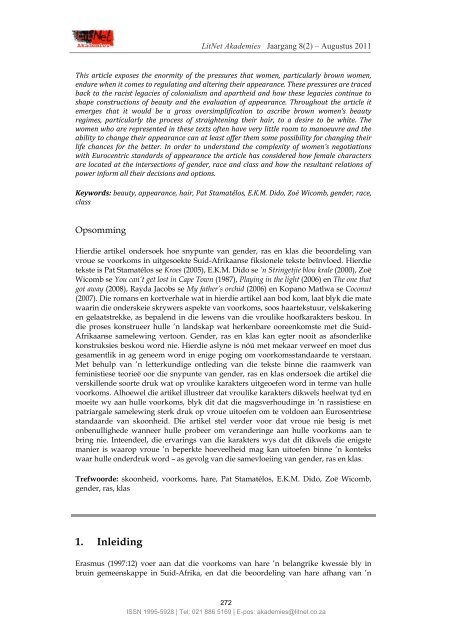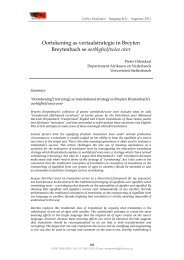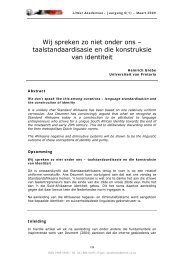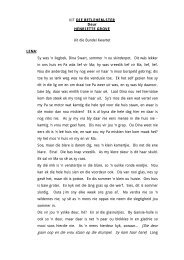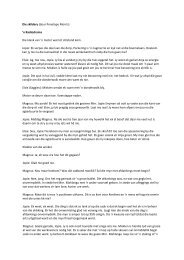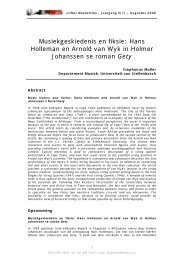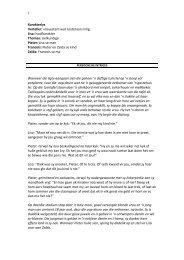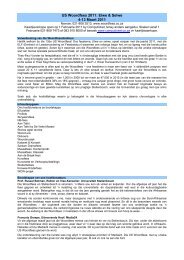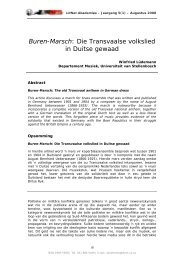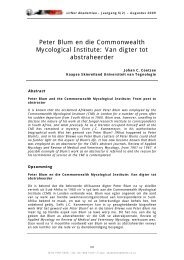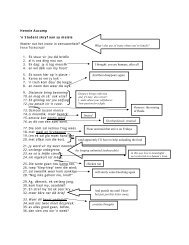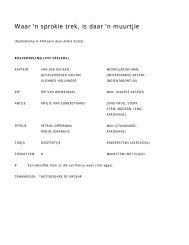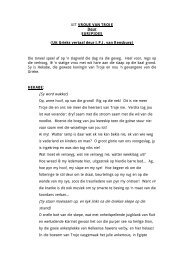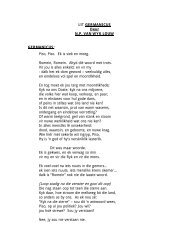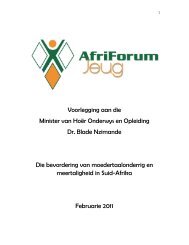Jaargang 8, nommer 2 – Augustus 2011 - LitNet
Jaargang 8, nommer 2 – Augustus 2011 - LitNet
Jaargang 8, nommer 2 – Augustus 2011 - LitNet
You also want an ePaper? Increase the reach of your titles
YUMPU automatically turns print PDFs into web optimized ePapers that Google loves.
<strong>LitNet</strong> Akademies <strong>Jaargang</strong> 8(2) <strong>–</strong> <strong>Augustus</strong> <strong>2011</strong><br />
This article exposes the enormity of the pressures that women, particularly brown women,<br />
endure when it comes to regulating and altering their appearance. These pressures are traced<br />
back to the racist legacies of colonialism and apartheid and how these legacies continue to<br />
shape constructions of beauty and the evaluation of appearance. Throughout the article it<br />
emerges that it would be a gross oversimplification to ascribe brown women’s beauty<br />
regimes, particularly the process of straightening their hair, to a desire to be white. The<br />
women who are represented in these texts often have very little room to manoeuvre and the<br />
ability to change their appearance can at least offer them some possibility for changing their<br />
life chances for the better. In order to understand the complexity of women’s negotiations<br />
with Eurocentric standards of appearance the article has considered how female characters<br />
are located at the intersections of gender, race and class and how the resultant relations of<br />
power inform all their decisions and options.<br />
Keywords: beauty, appearance, hair, Pat Stamatélos, E.K.M. Dido, Zoë Wicomb, gender, race,<br />
class<br />
Opsomming<br />
Hierdie artikel ondersoek hoe snypunte van gender, ras en klas die beoordeling van<br />
vroue se voorkoms in uitgesoekte Suid-Afrikaanse fiksionele tekste beïnvloed. Hierdie<br />
tekste is Pat Stamatélos se Kroes (2005), E.K.M. Dido se ’n Stringetjie blou krale (2000), Zoë<br />
Wicomb se You can’t get lost in Cape Town (1987), Playing in the light (2006) en The one that<br />
got away (2008), Rayda Jacobs se My father’s orchid (2006) en Kopano Matlwa se Coconut<br />
(2007). Die romans en kortverhale wat in hierdie artikel aan bod kom, laat blyk die mate<br />
waarin die onderskeie skrywers aspekte van voorkoms, soos haartekstuur, velskakering<br />
en gelaatstrekke, as bepalend in die lewens van die vroulike hoofkarakters beskou. In<br />
die proses konstrueer hulle ’n landskap wat herkenbare ooreenkomste met die Suid-<br />
Afrikaanse samelewing vertoon. Gender, ras en klas kan egter nooit as afsonderlike<br />
konstruksies beskou word nie. Hierdie aslyne is nóú met mekaar verweef en moet dus<br />
gesamentlik in ag geneem word in enige poging om voorkomsstandaarde te verstaan.<br />
Met behulp van ’n letterkundige ontleding van die tekste binne die raamwerk van<br />
feministiese teorieë oor die snypunte van gender, ras en klas ondersoek die artikel die<br />
verskillende soorte druk wat op vroulike karakters uitgeoefen word in terme van hulle<br />
voorkoms. Alhoewel die artikel illustreer dat vroulike karakters dikwels heelwat tyd en<br />
moeite wy aan hulle voorkoms, blyk dit dat die magsverhoudinge in ’n rassistiese en<br />
patriargale samelewing sterk druk op vroue uitoefen om te voldoen aan Eurosentriese<br />
standaarde van skoonheid. Die artikel stel verder voor dat vroue nie besig is met<br />
onbenullighede wanneer hulle probeer om veranderinge aan hulle voorkoms aan te<br />
bring nie. Inteendeel, die ervarings van die karakters wys dat dit dikwels die enigste<br />
manier is waarop vroue ’n beperkte hoeveelheid mag kan uitoefen binne ’n konteks<br />
waar hulle onderdruk word <strong>–</strong> as gevolg van die samevloeiing van gender, ras en klas.<br />
Trefwoorde: skoonheid, voorkoms, hare, Pat Stamatélos, E.K.M. Dido, Zoë Wicomb,<br />
gender, ras, klas<br />
1. Inleiding<br />
Erasmus (1997:12) voer aan dat die voorkoms van hare ’n belangrike kwessie bly in<br />
bruin gemeenskappe in Suid-Afrika, en dat die beoordeling van hare afhang van ’n<br />
272<br />
ISSN 1995-5928 | Tel: 021 886 5169 | E-pos: akademies@litnet.co.za


